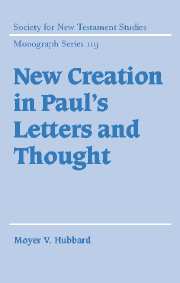Book contents
- Frontmatter
- Contents
- Acknowledgments
- List of abbreviations
- 1 Introduction: the current debate
- PART I NEW CREATION: CENTRAL JEWISH TEXTS
- Part II FROM DEATH TO LIFE: NEW CREATION IN THE CONTOURS OF PAUL'S THOUGHT
- 5 From death to life: insights from cultural anthropology
- 6 Newness of life: Romans 6.1–11
- 7 Newness of the Spirit: Romans 7.1–6
- 8 Spirit, newness, life: the Pauline antecedents
- 9 Crucified with Christ: Galatians 2.19–20
- Part III THE OLD AND THE NEW: NEW CREATION IN THE CONTEXT OF PAUL'S LETTERS
- References
- Index of passages cited
- Index of modern authors
9 - Crucified with Christ: Galatians 2.19–20
Published online by Cambridge University Press: 02 December 2009
- Frontmatter
- Contents
- Acknowledgments
- List of abbreviations
- 1 Introduction: the current debate
- PART I NEW CREATION: CENTRAL JEWISH TEXTS
- Part II FROM DEATH TO LIFE: NEW CREATION IN THE CONTOURS OF PAUL'S THOUGHT
- 5 From death to life: insights from cultural anthropology
- 6 Newness of life: Romans 6.1–11
- 7 Newness of the Spirit: Romans 7.1–6
- 8 Spirit, newness, life: the Pauline antecedents
- 9 Crucified with Christ: Galatians 2.19–20
- Part III THE OLD AND THE NEW: NEW CREATION IN THE CONTEXT OF PAUL'S LETTERS
- References
- Index of passages cited
- Index of modern authors
Summary
Is he from heaven or from hell?
And does he know
in granting me my life today,
this man has killed me even so?
Les MisérablesIn Galatians 2.19–20 there is yet another crux interpretum, recently described as “probably the most important single [text] for understanding Paul's theology.” While a number of passages could vie for such an accolade, Galatians 2.19–20 definitely belongs in the competition. Not surprisingly, this passage has its interpretive difficulties, especially its concise, heavily coded language. Barclay speaks for many when he says of it, “Paul's thought is so compressed as to be somewhat obscure”. This section (2.15–21) is equally crucial for understanding the argument of Galatians itself, and is often seen as a summary of what precedes and a précis of what follows. As a theological and epistolary nodal point, Galatians 2.19–20 repays close scrutiny and significantly augments the understanding of Paul's death–life symbolism. It underscores again the foundational nature of this soteriological metaphor for Paul, while at the same time illuminating the message of Galatians. Its epistolary significance will be highlighted in a later section (chapter 11), where I consider Paul's summary of his argument, Galatians 6.12–16.
Context
The line of thought in Galatians 2.15–21 is notoriously difficult and it is neither necessary nor feasible to enter into the intricacies of this debate here. Galatians 2.19–21 concludes Paul's version of the Antioch incident, and it is generally agreed that, somewhere along the line, the focus of Paul's address shifts from Peter to the Galatians.
- Type
- Chapter
- Information
- New Creation in Paul's Letters and Thought , pp. 123 - 130Publisher: Cambridge University PressPrint publication year: 2002



